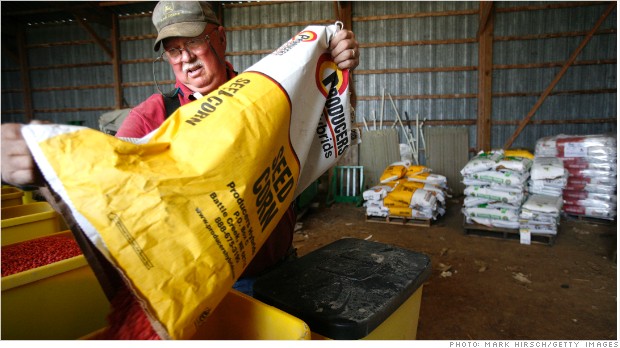Why China is stealing America's corn seeds

Three years ago, a security guard working for seed company Pioneer Hi-Bred came across something unusual on a road in Iowa: Just off the pavement, a man was on his knees, digging in a field.
Challenged by the
guard, Mo Hailong claimed to be an employee of the University of Iowa
who was traveling to a nearby conference. He jumped back in his car and
sped away.
U.S. authorities would later accuse Mo, and five other
Chinese nationals, of stealing corn seeds and attempting to smuggle
them back to China.
A seventh defendant, Mo Yun, was arrested
and charged Wednesday with stealing trade secrets for her husband's seed
company -- the Beijing Dabeinong Technology Group Company.
The
details of the case, laid out by prosecutors, underscore the difficulty
of safeguarding U.S. intellectual property, and the determination of
some foreign rivals to acquire technology by illicit means.
For
six years, the Chinese nationals hopscotched across rural Iowa and
Illinois, stealing valuable inbred corn seed from Pioneer, Monsanto (MON)
and LG Seeds, prosecutors said in an updated indictment. The group
rented storage facilities, bought their own testing field and concocted
elaborate cover stories.
"These are actually very serious
offenses," one of the accused said during a recorded conversation
reproduced in the indictment. "They could treat us as spies," his
colleague replied.
Three members of the group tried to smuggle
the stolen goods out of the U.S. in 2012, concealing hundreds of seeds
in Orville Redenbacher popcorn boxes and Subway napkins. One tried to
reach Canada; the others boarded aircraft bound for Beijing.
The Chinese nationals weren't risking imprisonment for just any corn --
they were after inbred seeds used to create the hybrids that are then
sold to farmers.
Inbreds are closely guarded secrets. Companies
spend tens of millions of dollars on research to produce strains that
boost yields and are resistant to drought and insects.
China
has become a major corn importer in recent years, and the stolen
technology could have played a role in boosting domestic production.
The case is the latest in a series of incidents involving Chinese
nationals working in the U.S. Some are accused of stealing rice
technology and aerospace secrets for China.
"Identifying and
deterring those focused on stealing trade secrets, propriety and
confidential information or national security information is the number
two priority for the FBI second only to terrorism," FBI special agent
Thomas Metz said in a statement.
Beijing Dabeinong Technology
Group Company, and its subsidiary, Beijing Kings Nower Seed, did not
respond to requests for comment.
Analysts say that Beijing's
use of economic espionage can be attributed in part to its drive to
modernize the country in recent decades.
The illicit
acquisition of technology has helped China accelerate the process,
bypassing problems that would otherwise require years of research to
resolve. It's an issue that has drawn the attention of the White House.
President Obama has raised the issue with his Chinese counterpart, Xi
Jinping. But his arguments have carried less weight following
revelations by Edward Snowden that U.S. agencies were attempting to monitor Chinese telecommunications company Huawei.
Chinese officials have been quick to levy charges of hypocrisy against
the U.S. An official at the Ministry of Foreign Affairs said in May that
the U.S. was engaged in theft of secrets and snooping on companies,
politicians and others.











0 comments:
Post a Comment